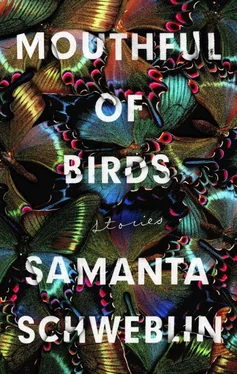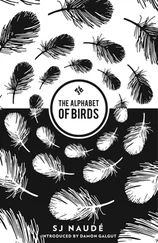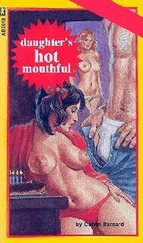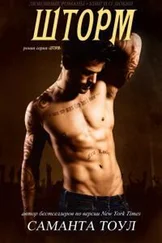“I need to think.”
“You don’t need to think, what you need is a few feet more.”
“I can’t do it without her…”
I thought about getting down a cool drink for him, I thought it could do him good, but when I started to get up Oliver stopped me.
“He has to do it on his own,” he said. “He has to learn.”
“Oliver…”
“Tell me something that you can do, one thing, anything.”
“I carry the food she gives me, I clean the tables…”
“Doesn’t look like it,” said Oliver.
“…I can mix the salads and season them if she leaves everything for me on the counter. I wash the dishes, clean the floor, shake out the—”
“Okay, okay. I get it.”
Then the guy stood looking at Oliver, as if surprised:
“You…” he said. “You can reach the fridge. You could cook, hand me things…”
“Say what? No one’s handing you anything.”
“But you could work, you’re tall enough.” He took a shy step toward Oliver, which to me didn’t seem very wise. “I’d pay you,” he said.
Oliver turned to me. “This guy’s fucking with me, he’s fucking with me.”
“I have money. Four hundred a week? I can pay you. Five hundred?”
“You pay five hundred a week? Why don’t you have a palace in the backyard? This asshole…”
I got up and stood behind Oliver: he was going to throw a punch any second. I think the only thing stopping him was the guy’s height.
We saw the guy close his little fists as though squeezing an invisible mass between his fingers, compressing it smaller and smaller. His arms started to tremble, and he turned purple.
“My money is none of your business,” he said.
Oliver kept looking at me every time the other man spoke to him, as if he couldn’t believe what he was hearing. He almost seemed to be enjoying it, but I know him better than anyone: no one tells Oliver what to do.
“And judging by the truck you drive,” said the guy as he looked out toward the road, “judging by your truck, one might say I manage money better than you.”
“Son of a bitch,” said Oliver, and he lunged at the guy. I managed to restrain him. The guy took a step back, without fear and with a dignity that added a few feet to his height. He waited until Oliver was calm and I’d let go of him.
“Okay,” said Oliver. “Okay.”
He stood looking at the guy; he was furious, but there was something else underneath his composure. Then he said:
“Where’s the money?”
I looked at Oliver without understanding.
“Are you going to rob me?”
“I’m going to do whatever the fuck I feel like, you piece of shit.”
“What are you doing?” I asked.
Oliver took a step, grabbed the guy by the front of his shirt, and lifted him into the air.
“Where’s your money? Let’s have it.”
The force with which Oliver had lifted him up left him swinging a little side to side. But the guy looked Oliver directly in the eyes and didn’t open his mouth.
Oliver let go of him. The guy fell, then adjusted his shirt.
“Okay,” said Oliver. “Either you bring the money or I’ll break your face.”
He raised a tightly closed fist and held it an inch away from the guy’s nose.
“All right,” said the short man; he took a slow step back, crossed the bar in the opposite direction from the kitchen, and disappeared through a door.
“Piece of shit.”
I moved closer to Oliver so the guy couldn’t hear us.
“What are you doing? He’s got his wife dead in the kitchen, let’s go.”
“Did you hear what he said about my truck? The asshole wants to hire me. He wants to be my boss, get it?”
Oliver started looking over the shelves above the bar, rifling through bottles, boxes, papers.
“The fucker’s money must be around here somewhere.”
“Oliver, let’s go. You’re crazy.”
He picked up a wooden box. It was old and had the word “Habanos” hand-carved on the lid.
“Here we are,” said Oliver.
“Get out of here right now,” we heard a voice say.
The short guy was standing in the middle of the room, and he was holding a double-barreled shotgun aimed right at Oliver’s head. Oliver hid the box behind his back. The guy clicked off the gun’s safety and said:
“One.”
“We’re going,” I said, and I took Oliver by the arm and started to walk. “I’m sorry, I’m really sorry. And I’m sorry about your wife, too, I…”
I had to use all my strength to get Oliver to follow me, the way mothers pull on stubborn children.
“Two.”
We passed right by him, the shotgun a couple feet from Oliver’s head.
“I’m sorry,” I said again.
We were close to the door. I let Oliver go out first so the guy wouldn’t see that he was carrying the box.
“Three.”
I let go of Oliver and ran to the truck. I don’t know if Oliver was afraid or not, but he didn’t run. I had to wait a few seconds clutching the handle of my door for him to open it. He put the box on the seat, started the engine, and we went out the same way we’d come in. The truck bumped a few times over the curb and then we were finally on the road. Only a while later, without taking his eyes from the highway, did he say:
“Open it.”
“We should…”
“Open it, you faggot.”
I picked up the box. It was light and too small to contain a fortune. It had a fake lock, like a toy treasure chest. I opened it.
“What’s in it? How much? How much?”
“You just drive,” I said. “I think it’s only papers.”
Oliver turned every once in a while to look at what I’d found. There was a name embossed on the underside of the lid; it said “Irman,” and beneath it was a photo of the short guy when he was very young, sitting on some suitcases in a terminal. He looked happy. I wondered who had taken the photo. There were also letters headed with his name: Dear Irman ; Irman, my love ; poems he had signed; a mint candy turned to dust; and a plastic medal for the best poet of the year with the logo of a social club.
“Is there money or not?”
“They’re letters,” I said.
Oliver grabbed the box from my hands and tossed it out the window.
“What are you doing?” I turned around a second to see the things scattered over the asphalt, the papers still in the air, the medal bouncing farther away.
“They’re letters,” he said.
And a while later:
“Look… We should have stopped here. ‘All-you-can-eat barbecue,’ did you see the sign? How much was it?”
And he shifted restlessly in his seat, as though he really did regret it.
The Mole says, Name, and I answer. I’d waited for him where I’d been told to and he came to pick me up in the Peugeot that I’m driving now. We’ve just met. He doesn’t look at me—they say he never looks anyone in the eyes. Age, he says. Forty-two, I say, and when he says, You’re old, I think that he must be older. He wears a pair of small dark glasses, and that must be why he’s called the Mole. He orders me to drive to the nearest plaza and then settles into his seat, relaxed. The test is easy but it’s very important to pass it, and so I’m nervous. If I don’t do things right, I won’t get in, and if I don’t get in, there’s no money. Money’s the only reason to get in.
Beating a dog to death in the Buenos Aires port is the test they use to see if you’re capable of doing something worse. They say, Something worse, and then look away, dissembling, as if we, those on the outside, didn’t know that worse means killing a person, beating a person to death.
When the avenue splits into two streets, I opt for the quieter one. A line of red lights changes to green, one after another, and lets us speed ahead until a space, dark and green, appears between the buildings. It occurs to me that it’s possible there are no dogs in this plaza, and then the Mole orders me to stop. You didn’t bring a club, he says. No, I say. But you’re not going to beat a dog to death without a weapon. I look at him but don’t answer. I know he’s going to say something, because I know him now; it’s easy to figure him out. But he enjoys the silence, enjoys thinking that every word he says is a strike against me. Then he swallows and seems to think: You won’t be killing anyone. And finally he says: I happen to have a shovel in the trunk, you can use that. And I’m sure that beneath his sunglasses, his eyes are shining with pleasure.
Читать дальше








![Саманта Швеблин - Дистанция спасения [litres]](/books/427178/samanta-shveblin-distanciya-spaseniya-litres-thumb.webp)



